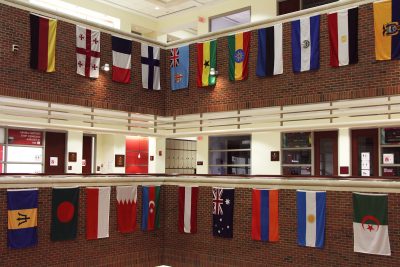A multicultural background allows many students to view the world through a range of different lenses. But, while the United States prides itself on its cultural “melting pot,” some international students at Boston University said they can still feel as if they don’t belong.

Ellie Hu, a sophomore in the College of Arts and Sciences and the College of Communication, is an international student from China.
Hu said she has studied English since kindergarten and went to an international high school.
“[At] the international school,” Hu said, “we put English as our priority.”
However, she said she often feels lost and unfamiliar with some aspects of American culture — aspects that seem to mark her as an outsider.
“Sometimes in the class, because of some cultural differences, I can’t really get what the professor is saying,” Hu said. “Maybe he or she is saying some joke but you can’t get it because you’re not born in America, and you’re not used to that kind of culture so you can have a kind of embarrassed feeling.”
Hu chose to go by “Ellie,” a mainstream American name, in her classes and in daily life at BU. Her birth name is Xiaoyun, but she wanted to avoid the difficulty Americans may experience in properly pronouncing or spelling her name.
“They are both names,” she said, “but they can’t understand, ‘what does Xiaoyun mean?’”
Hu said she felt her Chinese name makes other people feel distanced from her. Adopting an American name made relationships easier, she said.
“If I’m still using my Chinese name in the U.S., I think some people can’t even spell my name accurately, and they will feel a difference between you and me, and I don’t want people to have that feeling,” she said. “I want to use an English name so they can spell it, they can read it and they know ‘Okay, you are Ellie.’”
However, despite her efforts to integrate into the American community at BU, Hu said “it’s not even a question” of whether stereotypes exist.
“Stereotypes are always there,” Hu said. “Even though people don’t say it, they will show it.”
Shaurya Sinha, a recent alumnus of the Graduate School of Arts and Sciences, said his personal identity integrates several different cultures.
“In all meanings of the word, I am a third-culture kid,” he said, “which basically means someone who has been raised in a lot of different cultures, who doesn’t necessarily relate to a specific one.”
Sinha, who was born in India, has moved around many times in his life, and said he has adopted different strategies to make each transition easier.
“My personal identity is scattered over many different cultures I feel,” Sinha said. “I’ve developed coping mechanisms to integrate really well, one of those mechanisms being my name.”
Sinha said he introduces himself differently depending on his environment and the people who are around him the most — and who will actually remember it.
“If it’s going to be people whose cultures have normally extravagant names, I’ll give them my full name because I have a feeling that they’ll remember it because they have experience with it,” he said, “But in general, I felt a lot of Western cultures don’t, and I’ve had to shorten it down to one or two syllables.”
Sinha said he does encounter race-related prejudice in his daily life, but people will often make assumptions based on his ethnic identity, which contorts their perception of who he really is.
“I get a lot of the positive stereotypes as well like, ‘oh, this guy’s smart, oh this guy knows computers,’ but it’s not all of who I am,” he said. “It’s something I’ve had to fight against.”
Sinha said he sometimes dresses differently and tells people he’s from Singapore, instead of India, as a way to combat some of these beliefs.
Andy Chang, a senior in CAS and the Questrom School of Business, said he was born in America, but has moved to different countries several times throughout his childhood. He said adjusting to other customs and lifestyles at times made him feel “isolated culturally.”
“Especially when I moved back to the U.S. for high school, I grew as a person, more consciousness and perspective,” Chang said, “and I realized that there is an isolation type of feeling when I came back.”
For Chang, he said he doesn’t feel as though he fits into American culture, but he doesn’t necessarily see that as a bad thing.
“I feel like trying to integrate within the cultures, not trying to fit yourself in, it’s more about learning about the culture,” he said. “I wouldn’t say I fit in in American culture, but I learn about it, I experienced it… [but] I don’t feel like I need to fit in.”
Sinha said as far as eradicating stereotypes, he encourages people to educate themselves and commit to being better.
“Westerners, in specific, need to take a proactive effort to educate themselves through experience,” he said. “I think reading about this kind of stuff is not enough.”














